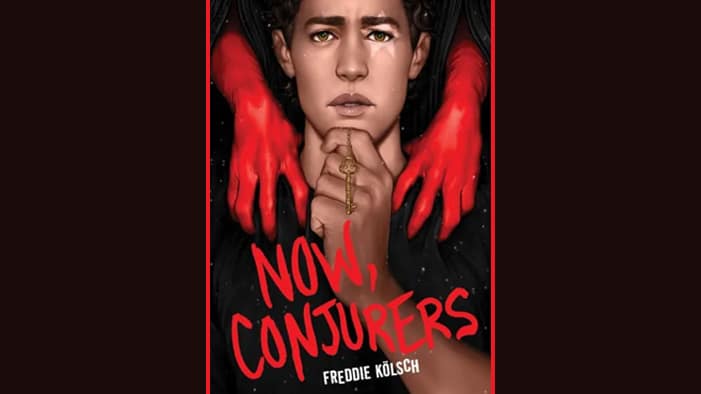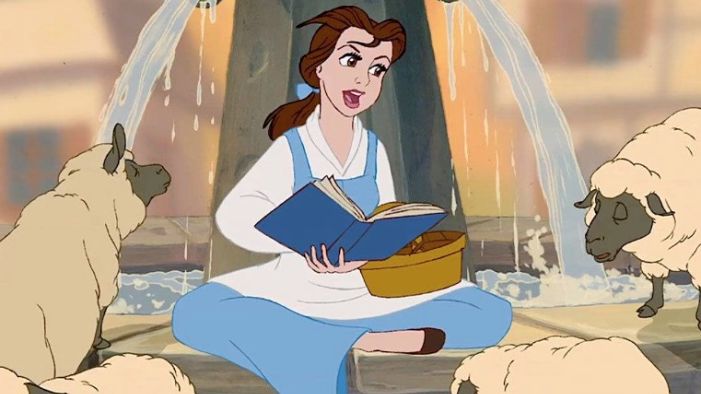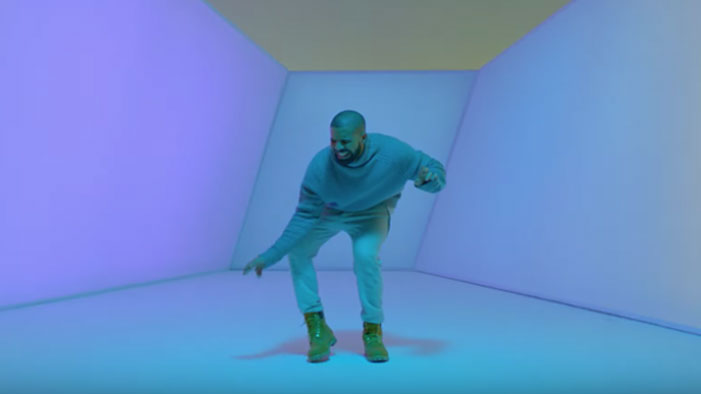The Stuff That Life Is Made Of: A Q&A with Freddie Kölsch, Author of Now, Conjurers

This post is from our literary besties over at the B&N Reads; to find more of Isabelle McConville’s work, click here!
We love celebrating debut authors — and Now, Conjurers, Freddie Kölsch’s hauntingly atmospheric tale of horror and grief, identity and community has cemented her as an author to keep our eyes on. Freddie joined our blog writer Isabelle McConville to talk all things Now, Conjurers; read their conversation below!
IM: Hello, my name is Isabelle McConville, and I am a bookseller and blog writer here at Barnes & Noble. I’m here with the wonderful Freddie Kölsch to talk all about her debut novel Now, Conjurers— I’m so excited to talk about this book I’ve been a fan of for the past two years already. Thank you so much for being here.
FK: Thank you so much. It’s a pleasure to be here. And I’m always willing to talk about this book.
IM: I was an intern for the children’s editorial team at Union Square and Company and I still remember the day I came across this manuscript. I read it all before lunch, in one sitting, and I knew I needed to talk to the editor right away. I’m so glad I did. What’s your elevator pitch for this novel?
FK: A queer The Craft meets be careful what you wish for, for people who are nostalgic for the y2k era, or potentially wish they had lived done but weren’t born yet.
IM: I love that, I think I actually need that on a t- shirt.
FK: Long t-shirt. It would be a long t- shirt, but a really good one.
IM: The characters in this novel are all so vibrant and so alive. We have our narrator Nesbit, and his doomed boyfriend, Bastion, and the rest of the Coven, Dove, Drea and Brandy. How did they come to life for you? And how did you decide on their different personalities and their distinct roles within the coven? Because it’s all very specific, what they do what they bring to the novel, and how they interact with each other.
FK: I don’t plot, like I’m a good as they call it a “pantser.” So, I just go as I go. I think their personalities asserted themselves as I wrote. But every single one of them has aspects of my clique as a teenager. We were complete dirtbags. In fact, I think these kids are much better behaved than we were, especially if we had magic powers. My best friend has been my best friend for 20 years. And he was in like our version of this clique, right? So, when he was reading it, he’s like, I see a little bit of you and a little bit of me and a little bit of this person, and it’s all mixed up. Except for Bastion, I don’t think any human being is actually like that, but it’d be nice if they were so wonderful.
IM: He was one of my favorite parts of the novel. He’s such a unique character, and I love that he was also the leader of the coven. So was there anything that went into you deciding who was the hands and who was the heart or did that just like you said, come naturally?
FK: I just made that up! In the middle of that scene, I was like, ooh a motif, maybe.
IM: Coming across this in my research was really, really, really exciting — the town of Dana, Massachusetts was real! What made you want to write about this real ghost town?
FK: I grew up in Connecticut, and the Quabbin reservoir is right above it in Massachusetts, and it’s so huge. It is, like I say in the book, literally four towns big because they actually flooded four towns to make a reservoir that could satisfy the thirst of Boston, essentially.
I first heard about it, I think through HP Lovecraft, who I don’t even necessarily want to bring up or give any credence to, but he definitely wrote about it being formed. It was in The Colour Out of Space, but other people have had it, too. It’s in a Stephen King book, — Dream Catcher. But there’s a bunch of short stories that take place around there. But nothing really compares to going there. Every couple of months I make my wife go on the two- and- a- half hour drive with me where you can walk out down this long path into what used to be Dana and see all of these stone foundations in it, everything that wasn’t quite flooded when they flooded the reservoir because the water levels never got as high as they wanted. It’s this profoundly haunting feeling. When people go there, they always get that feeling of ruin and loss from the past. And it’s just very cool. I plan on setting a bunch of books there and I hope it gets so much tourism. It’s amazing. It’s a national treasure.
IM: There is a really fun scene where the characters are in a library doing their own research. How did you do your research on the town and what you wanted to write about?
FK: If it was 1999 I definitely would have done that, but it was just me and my laptop sitting there. The aspects of the town are based on the small town I lived in for part of high school in Connecticut. So, that vibe of a small, isolated town I mostly made up and then googled to see if anyone could call me out on being inaccurate. And if there was plausible deniability, I just went with it.
IM: Another thing I really loved about this book is the way that you play with memory, and how we can keep people alive, even just in our dreams and in our minds. What made you want to write about that?
FK: Let’s just say, I didn’t. Going into it I thought that I just wanted to write a genre book, but everyone is queer, right? Because that’s what I wanted to read when I was growing up. I graduated in 2005, and that was like the very beginning of stuff like that being on the market. There are a lot of like brave people who paved the way forward for that. But when I was growing up, most of the books that people pioneered that had, really, in your face queer characters, especially for younger people were just about being where they were struggle books, which I respect, and I think is a necessary part of the journey. But I was like society has progressed to the point where we can [write queer genre stories].. I’m gonna write a pure ridiculous horror, romance fantasy thing about genre tropes with gay people. And then I finished it. And I was like, Oh, oops, I wrote a book about grief. I hope it’s not too preachy, but that is what I ended up doing. I like to think that every writer kind of creates like their own universe with its own morality; it can be like a really bad universe or a neutral universe. And I like to think this universe errs slightly on the side of like, a benevolent universe. So it’s like grief, but slightly better, with more closure.
IM: I would absolutely agree with that. I loved the way that you wrote about memory and how the characters fight so hard to keep their friends alive. I remember when I read this manuscript, I literally cried at my desk, and I was still an intern. You kind of touched on another question I wanted to ask you; why do you think we see so many queer stories told in genre fiction like horror?
FK: I remember something Stephen King said, that horror was a conservative genre. And he wasn’t saying that as if he’s a conservative, he was saying that he uses these ripped- from- the- headlines things and plays on the fear of these things happening to the average American consumer. And they’re scared of that, and they buy the book. But I couldn’t. I don’t think there’s anything more off base. I always think that horror as a genre has pushed the bounds of what is intellectually and socially acceptable.And the things that are between the pages of a book are always there decades before you can see them on television, right? I don’t know why it’s like a secret. I don’t like the fact that that’s kind of being censored and threatened now, but I do still think we retain some of our advantage over people who don’t want to read an entire book. So, I think that a lot of people who grew up feeling different, write a lot of genre stuff, specifically horror, and they created it themselves. Created their horrifying worlds or their ideal worlds, but worlds where the stakes were so high, that they could just exist in — and the stakes weren’t at all about being queer.
IM: There are a lot of really great 90s references in here, specifically The Craft and the music Nesbit listens to on the radio. What other books and movies shaped the way and inspired this book while you were writing it?
FK: I would say the answers are all over the place. Definitely Stephen King, it’s got to be Needful Things because it has that whole wish aspect, but even more than that, Needful Things was his take on the Ray Bradbury book Something Wicked This Way Comes. So probably Bradbury, but if he wasn’t so sanitized. Can you imagine him reading a book like this? And then like, I don’t know, younger kid books. Can I ask you what is the age that you were when you read the books that are most formative to your taste?
IM: Oh, honestly, I would say probably between the ages of 8-13.
FK: I totally agree. It’s younger than the audience that this book is intended for. One of my big ones between the ages of 8 and 13 was A Wrinkle in Time. I have lines that are just straight up homages to A Wrinkle in Time in this and they don’t even necessarily make sense contextually, but I put it in there. And The NeverEnding Story, which is a great movie I will defend to my last breath. I sing the song to myself sometimes — it’s a really rockin theme song. But the book is one of those fairy tales for all ages that never feels too preachy and always feels interesting. You get something out of it no matter what age you are.
IM: How did you know you wanted this book to be YA?
FK: There are genre conventions when it comes to young adult, but it’s also the strangest, widest thing with people reading it all across age groups and it really appealed to me. I’d never written anything in first person before this and I wanted to see if I could do that. I mostly wrote it for teenage me with the resolutions I would want, the endings I would want, and the characters I would want. There’s a character in it who is very analogous to me, so I wanted to make sure that he had an okay time essentially.
IM: How did writing in first person differ from writing in third person?
FK: I had this idea that somehow writing in first person was lesser, which is insane and ridiculous because Nabokov wrote in the first person, James Joyce wrote in first person. I had this idea, probably from reading so much fan fiction growing up, that somehow first person was terrible. And then writing it, I was like, Oh, it’s actually hard! You don’t have that omniscient thing where you can zoom out and tell someone the other things that are happening. There’s such an immediacy to it. I like that immediacy. At first, I thought, it just appealed to teenagers, but now I think it appeals to everyone. I’d say it’s an ongoing challenge. I’m still trying to learn how to be good at it.
IM: I think this book fits so well in young adult. What I love about YA is that no matter how old you are, you can always come to this genre for all kinds of coming of age. We’re always coming of age, no matter how old we are and I think we’re always trying to get back to those kinds of books. What are you hoping people take away from reading this book?
FK: My hope is that people, especially teenagers, who I think really need it, will be happily, purely entertained for a while. And at the end, they won’t feel like they’ve wasted their time, and they’ve maybe seen themselves in some of those people. I think that’s what I want the most. Because when I read books, the ones that are actually profound to me in the long run, are the ones that entertained me the most. It sounds trite, but it’s the stuff that life is made of.
IM: How does it feel to share Now, Conjurers with the world now?
FK: I am nervous about it. It’s very nerve wracking to me. I went to Texas and I spoke on a panel and all I heard was ringing in my ears., I have no idea what I said. I think a lot of authors are introverts who are really doing their best because they want to create —  it’s scary, but exciting. Every time someone in Now, Conjurer’s demographic says something about it being good, that makes me feel wonderful. My full-time job is at a grocery store, and they’ll greet me with how many days are left until publication when I go in.
IM: Are there any books right now on your nightstand that you want people to read?
FK: There’s a book that’s coming out in August, called Here Lies a Vengeful Bitch. It’s one of those “good for her” books, you know, where there’s just an absolutely deranged main character doing the things that all women want to do and can’t.
IM: What can you tell us about what you’re working on next?
FK: My next book takes place in the same area around my beloved Quabbin reservoir but it has a different cast. And I think it takes place like a year in the future. I will say that it was my attempt to take everything that you know about folklore, and subvert your expectations, while also paying homage to my profound obsession with scary scarecrows.
IM: Thank you so much for doing this today, Freddie. I love talking about this book and I’m recommending it to every person I know.
FK: It was such a pleasure, thank you.















